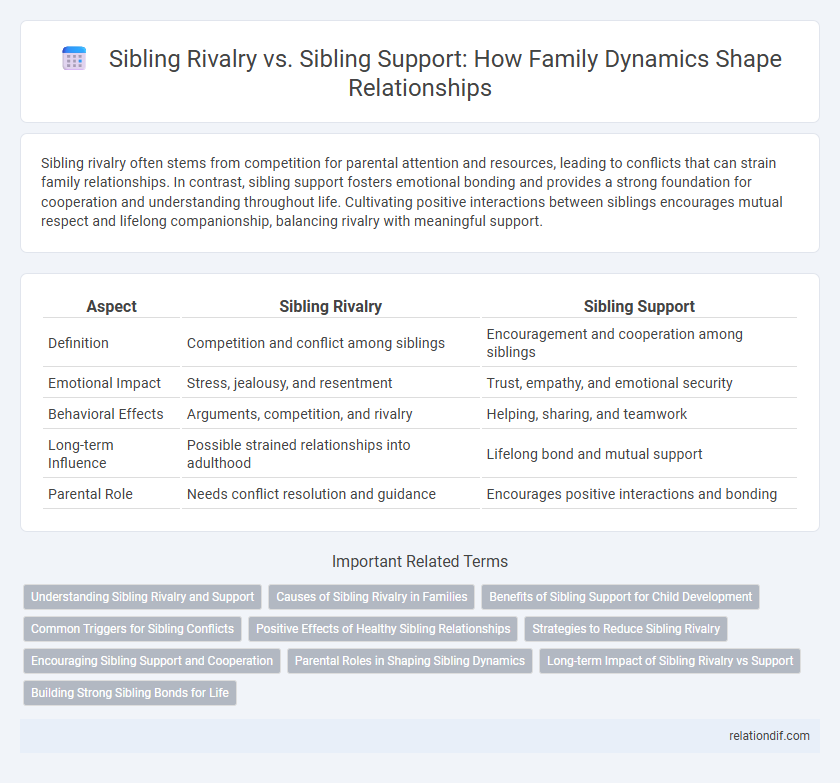Sibling rivalry often stems from competition for parental attention and resources, leading to conflicts that can strain family relationships. In contrast, sibling support fosters emotional bonding and provides a strong foundation for cooperation and understanding throughout life. Cultivating positive interactions between siblings encourages mutual respect and lifelong companionship, balancing rivalry with meaningful support.
Table of Comparison
| Aspect | Sibling Rivalry | Sibling Support |
|---|---|---|
| Definition | Competition and conflict among siblings | Encouragement and cooperation among siblings |
| Emotional Impact | Stress, jealousy, and resentment | Trust, empathy, and emotional security |
| Behavioral Effects | Arguments, competition, and rivalry | Helping, sharing, and teamwork |
| Long-term Influence | Possible strained relationships into adulthood | Lifelong bond and mutual support |
| Parental Role | Needs conflict resolution and guidance | Encourages positive interactions and bonding |
Understanding Sibling Rivalry and Support
Sibling rivalry emerges from competition for parental attention and resources, often causing conflict and emotional stress. Sibling support fosters empathy, cooperation, and shared problem-solving, strengthening family bonds and emotional resilience. Understanding these dynamics helps families promote positive interactions while addressing conflicts constructively.
Causes of Sibling Rivalry in Families
Sibling rivalry often stems from competition for parental attention, differences in personality, and perceived favoritism within families. Environmental stressors, such as financial strain or family changes like divorce, can intensify conflicts between siblings. Understanding these causes helps parents foster sibling support by promoting fairness, communication, and emotional bonding.
Benefits of Sibling Support for Child Development
Sibling support fosters emotional security and social skills, enhancing a child's ability to form healthy relationships. Positive sibling interactions contribute to higher self-esteem and better conflict resolution abilities. These benefits promote resilience and overall psychological well-being throughout childhood and beyond.
Common Triggers for Sibling Conflicts
Common triggers for sibling conflicts include competition for parental attention, sharing resources like toys or space, and differences in personality or age. Emotional factors such as jealousy, perceived favoritism, and communication misunderstandings also frequently escalate rivalry. Recognizing these triggers is essential in fostering sibling support and promoting healthier family dynamics.
Positive Effects of Healthy Sibling Relationships
Healthy sibling relationships foster emotional resilience, enhance social skills, and provide lifelong support networks essential for personal development. Positive sibling interactions encourage empathy, conflict resolution, and shared experiences that contribute to a stable family environment. Studies show that siblings who engage in supportive behaviors exhibit lower levels of stress and higher overall well-being throughout their lives.
Strategies to Reduce Sibling Rivalry
Effective strategies to reduce sibling rivalry include establishing clear family rules that promote respect and fairness, encouraging open communication to address conflicts early, and providing individual attention to each child to fulfill their emotional needs. Implementing regular family activities fosters bonding and teamwork, while teaching conflict resolution skills helps siblings navigate disagreements constructively. Parents can also model positive behavior and reinforce cooperation through consistent praise and rewards for supportive interactions.
Encouraging Sibling Support and Cooperation
Encouraging sibling support and cooperation fosters emotional resilience and strengthens family bonds, promoting a positive household environment. Parents can facilitate this by modeling respectful communication, setting collaborative goals, and rewarding teamwork among siblings. Consistent encouragement of empathy and shared problem-solving skills reduces sibling rivalry and nurtures lifelong supportive relationships.
Parental Roles in Shaping Sibling Dynamics
Parental roles significantly influence sibling rivalry and support by establishing boundaries and fostering communication that promote healthy relationships. Consistent parental involvement, such as fair discipline and individual attention, reduces competition and encourages cooperation among siblings. By modeling empathy and conflict resolution, parents shape positive sibling dynamics that strengthen familial bonds.
Long-term Impact of Sibling Rivalry vs Support
Sibling rivalry often leads to lasting emotional distance and increased stress, which can negatively affect mental health and interpersonal relationships throughout adulthood. In contrast, sibling support fosters strong bonds, enhancing emotional resilience and providing a reliable network for coping with life's challenges. Research shows individuals with supportive siblings experience improved self-esteem and reduced risk of depression in the long term.
Building Strong Sibling Bonds for Life
Sibling rivalry often stems from competition for parental attention and resources, leading to conflicts that can impact family dynamics. Emphasizing open communication, empathy, and shared experiences fosters sibling support, creating a foundation for trust and cooperation. Building strong sibling bonds enhances emotional resilience and provides lifelong companionship, contributing positively to mental health and family cohesion.
Sibling rivalry vs Sibling support Infographic

 relationdif.com
relationdif.com